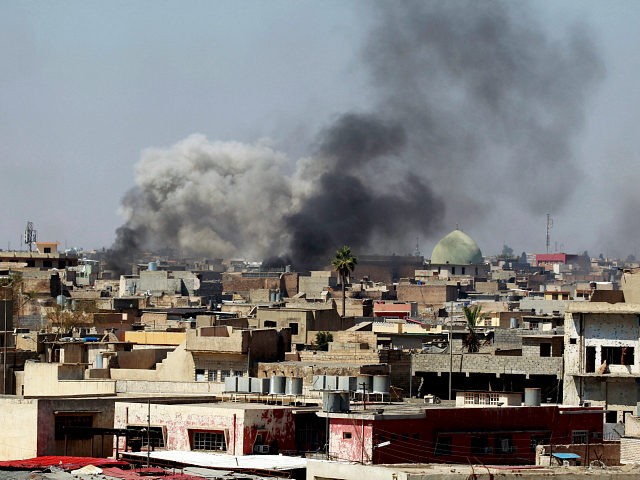On Friday, the Pentagon announced it would investigate claims of up to 200 civilian casualties after airstrikes in Mosul, Iraq.
The New York Times reports there have been questions about whether higher civilian casualties are the result of altered rules of engagement and the response from U.S. military officials that those rules have not changed significantly. However, these officials said the tempo of airstrikes in both Syria and Iraq has increased as coalition fighters push the Islamic State harder in both countries.
U.S. officials also said some of the casualties could be the result of ISIS activity, although an Iraqi general has taken responsibility for one incident in particular:
Maj. Gen. Maan al-Saadi, a commander of the Iraqi special forces, said that the civilian deaths were a result of a coalition airstrike that his men had called in, to take out snipers on the roofs of three houses in a neighborhood called Mosul Jidideh. General Saadi said the special forces were unaware that the houses’ basements were filled with civilians.
“After the bombing we were surprised by the civilian victims,” the general said, “and I think it was a trap by ISIS to stop the bombing operations and turn public opinion against us.”
General Saadi said he had demanded that the coalition pause its air campaign to assess what happened and to take stricter measures to prevent more civilian victims.
The NYT goes on to cite one Iraqi special forces officer who claims the rules of engagement have been relaxed since President Trump took office, although the report also notes that Iraqi officers complained about the difficulty of calling in U.S. air support under the Obama administration.
Pentagon spokesman Capt. Jeff Davis said there has been “no loosening of the rules of engagement” and pointed out the U.S.-led coalition is now participating in three major battles: Mosul, Raqqa, and the fierce struggle for the strategic Tabqa Dam near Raqqa.
Reuters reported on Monday that U.S.-backed Syrian militia forces have called a temporary halt to operations near the Tabqa Dam because they are worried about possible damage to the structure. The Syrian government is blaming U.S. airstrikes for knocking out the hydroelectric generator at the facility, but representatives of the Kurdish-led Syrian Democratic Forces militia denied that American strikes have damaged the dam.
Greater amounts of collateral damage are probably unavoidable from such intense operations in areas where ISIS militants are mixed with civilians. No one seems to dispute that ISIS fighters are, at best, indifferent to the suffering of civilians, and are quite willing to inflict civilian casualties when it suits their purposes. One especially disturbing ISIS tactic involves using occupied civilian structures for sniper nests, which is what happened in the incident General al-Saadi describes above.
The New York Times quotes Mosul mayor Abdulsattar Alhabu warning that civilian casualties will “make the mission to liberate Mosul” harder because citizens living under ISIS domination will be less likely to cooperate with liberating forces. That is certainly what ISIS is hoping for. The terror state can be counted upon to do everything possible to maximize civilian loss of life.
On Monday, Al-Jazeera related accounts from several civilians who witnessed airstrikes in Mosul. The report notes these witnesses could not tell if U.S., Iraqi, or other forces conducted the strikes they saw. Some of them talked about ISIS-run field hospitals refusing to treat injured civilians. One man was told, “You go sit at home, and wait for the apostates to come to you.”
Anna Botting of Sky News reported a chilling scene from the liberated sectors of Mosul on Monday:
In Chamakor camp, which was clean, spacious and carefully laid out, there are 11,800 refugees from west Mosul, 6,600 of them children.
A camp official told me he saw some of them, aged six or seven, cutting the head off a mud figure.
“One of them had a knife and started beheading it, shouting ‘Allahu Akhbar’,” he said.
“There is manhood, they told me, in cutting the head off.”
One 14-year-old told Sky News, “There was no education under Islamic State, just how to kill, how to grow long beards and wear short trousers.”
UNICEF officials expressed fears that ISIS has poisoned the minds of an entire generation of children who lived under its control in Iraq and Syria for years. To combat that malign influence, the United Nations has been setting up classrooms in tents at refugee camps.
The U.N. is also working hard to convince refugees to leave the camps and return to their homes in the cleared areas of Mosul, but this is understandably difficult given the terrors they faced under ISIS, and the fierce battles still being fought in ISIS-occupied quarters of the city. Encouragingly, Sky News reports that 341 schools serving some 300,000 children have been re-opened in the city.
Another optimistic report from Sky News describes the Battle of Mosul as a “death rattle” for ISIS, while conceding that civilians caught in the midst of intense urban warfare and air assaults must find the experience terrifying. The result of these fierce struggles is that the Islamic State has lost about 80 percent of its territory since its high-water mark in 2016, and its revenue has collapsed from $2 billion a year to about $800 million.

COMMENTS
Please let us know if you're having issues with commenting.